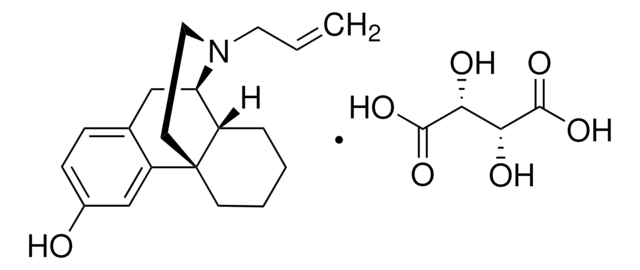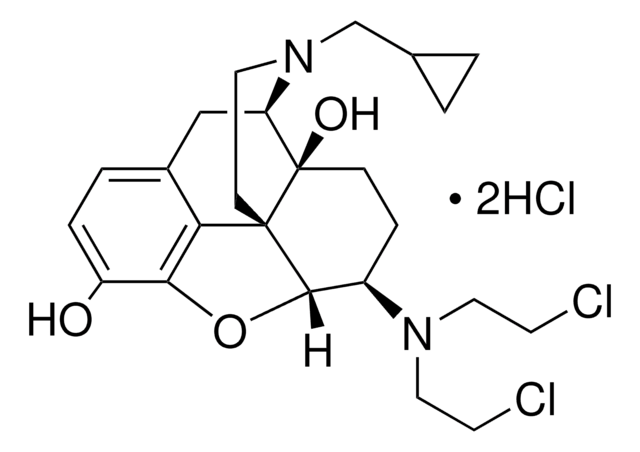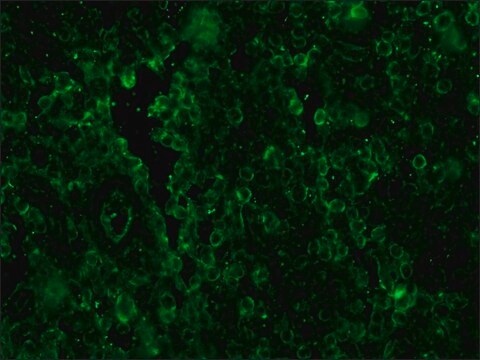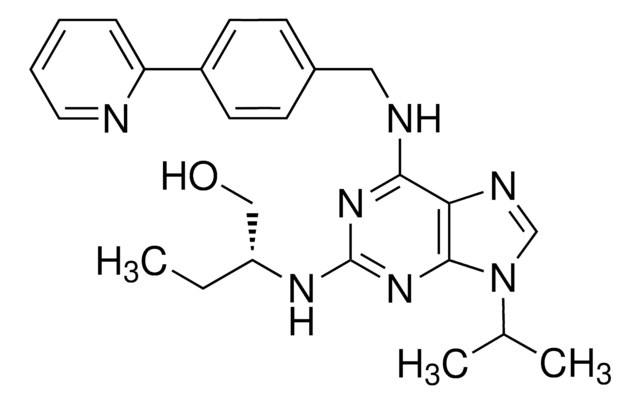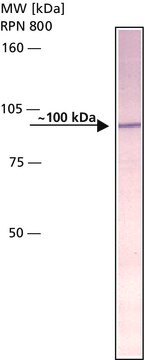G3416
5′-Guanidinonaltrindole di(trifluoroacetate) salt hydrate
solid, ≥98% (HPLC)
Synonyme(s) :
GNTI
Se connecterpour consulter vos tarifs contractuels et ceux de votre entreprise/organisme
About This Item
Formule empirique (notation de Hill):
C27H29N5O3 · 2C2HF3O2 · xH2O
Numéro CAS:
Poids moléculaire :
699.60 (anhydrous basis)
Numéro MDL:
Code UNSPSC :
12352202
ID de substance PubChem :
Nomenclature NACRES :
NA.77
Produits recommandés
Niveau de qualité
Essai
≥98% (HPLC)
Forme
solid
Solubilité
H2O: 30 mg/mL
Température de stockage
2-8°C
Informations sur le gène
human ... OPRK1(4986)
Application
5′-Guanidinonaltrindole di(trifluoroacetate) salt hydrate (GNTI) has been used as a selective κ opioid receptor antagonist:
- to study the influence of opioid receptor types on the anti-hyperalgesic effect of dipeptidyl peptidase 4 (DPP4) inhibitors in inflammation
- to study the role of κ opioid receptor in the forebrain-dependent associative task, Whisker-Trace Eyeblink conditioning (WTEB)
- to validate its inhibitory actions on Akt kinase activities
Actions biochimiques/physiologiques
5′-Guanidinonaltrindole di(trifluoroacetate) (GNTI) is a 5‘-guanidine derivative and a selective κ opiate receptor antagonist. It is five-fold more potent and 500-fold more selective than norbinaltorphimine (nor-BNI) for the κ opioid receptor in smooth muscle preparations.
Caractéristiques et avantages
This compound is featured on the Opioid Receptors page of the Handbook of Receptor Classification and Signal Transduction. To browse other handbook pages, click here.
Informations légales
Sold under US Patent No. 6,500,824.
Code de la classe de stockage
11 - Combustible Solids
Classe de danger pour l'eau (WGK)
WGK 3
Point d'éclair (°F)
Not applicable
Point d'éclair (°C)
Not applicable
Équipement de protection individuelle
Eyeshields, Gloves, type N95 (US)
Faites votre choix parmi les versions les plus récentes :
Certificats d'analyse (COA)
Lot/Batch Number
Vous ne trouvez pas la bonne version ?
Si vous avez besoin d'une version particulière, vous pouvez rechercher un certificat spécifique par le numéro de lot.
Déjà en possession de ce produit ?
Retrouvez la documentation relative aux produits que vous avez récemment achetés dans la Bibliothèque de documents.
Pathology and glia type specific changes of the DPP4 activity in the spinal cord contributes to the development and maintenance of hyperalgesia and shapes opioid signalling in chronic pain states
KiralyK, et al.
Scientific Reports (2017)
Pathology and glia type specific changes of the DPP4 activity in the spinal cord contributes to the development and maintenance of hyperalgesia and shapes opioid signalling in chronic pain states
KiralyK, et al.
Scientific reports (2017)
R M Jones et al.
European journal of pharmacology, 396(1), 49-52 (2000-05-24)
5'-Guanidinonaltrindole (GNTI) possesses 5-fold greater opioid antagonist potency (K(e)=0.04 nM) and an order of magnitude greater selectivity (selectivity ratios >500) than the prototypical kappa-opioid receptor antagonist, norbinaltorphimine, in smooth muscle preparations. Binding and functional studies conducted on cloned human opioid
C T Chan et al.
Molecular imaging and biology, 11(3), 144-158 (2008-12-03)
Protein phosphorylation mediated by protein kinases controls numerous cellular processes. A genetically encoded, generalizable split firefly luciferase (FL)-assisted complementation system was developed for noninvasive monitoring phosphorylation events and efficacies of kinase inhibitors in cell culture and in small living subjects
Ryan Loh et al.
Behavioural brain research, 323, 1-10 (2017-01-26)
Previous work from our laboratory has shown that nonspecific kappa opioid receptor (KOR) antagonism in primary somatosensory cortex (S1) can inhibit acquisition for the forebrain-dependent associative task, Whisker-Trace Eyeblink conditioning (WTEB). Although studies have demonstrated that KOR activation can alter
Notre équipe de scientifiques dispose d'une expérience dans tous les secteurs de la recherche, notamment en sciences de la vie, science des matériaux, synthèse chimique, chromatographie, analyse et dans de nombreux autres domaines..
Contacter notre Service technique